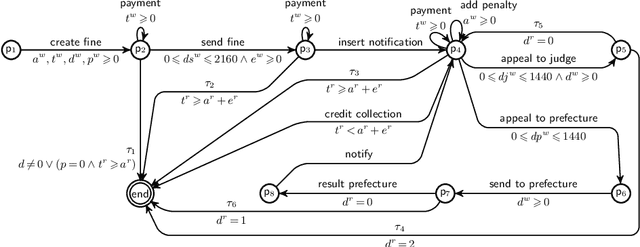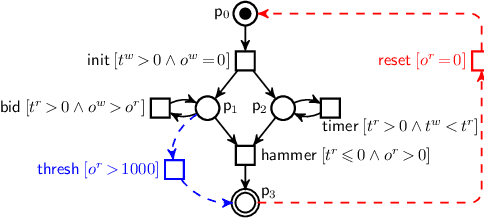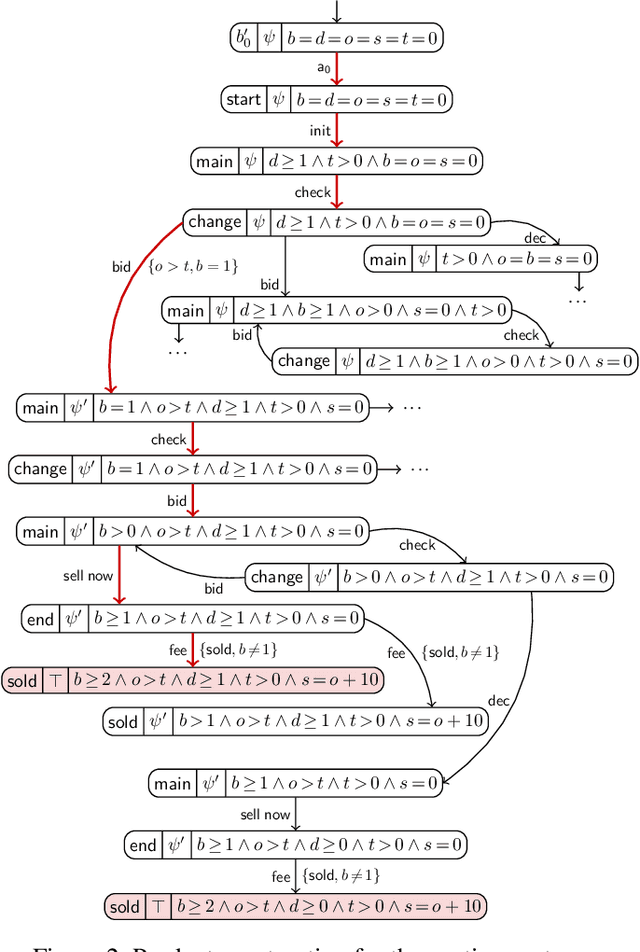Sarah Winkler
Object-Centric Conformance Alignments with Synchronization (Extended Version)
Dec 13, 2023


Abstract:Real-world processes operate on objects that are inter-dependent. To accurately reflect the nature of such processes, object-centric process mining techniques are needed, notably conformance checking. However, while the object-centric perspective has recently gained traction, few concrete process mining techniques have been presented so far. Moreover, existing approaches are severely limited in their abilities to keep track of object identity and object dependencies. Consequently, serious problems in logs remain undetected. In this paper, we present a new formalism that combines the key modelling features of two existing approaches, in particular the ability of object-centric Petri nets to capture one-to-many relations and the one of Petri nets with identifiers to compare and synchronize objects based on their identity. We call the resulting formalism 'object-centric Petri nets with identifiers', and define alignments and the conformance checking task for this setting. We propose a conformance checking approach for such nets based on an encoding in satisfiability modulo theories (SMT), and illustrate how it can be effectively used to overcome shortcomings of earlier work. To assess its practicality, we perform an evaluation on data from the literature.
Decidable Fragments of LTLf Modulo Theories (Extended Version)
Jul 31, 2023Abstract:We study Linear Temporal Logic Modulo Theories over Finite Traces (LTLfMT), a recently introduced extension of LTL over finite traces (LTLf) where propositions are replaced by first-order formulas and where first-order variables referring to different time points can be compared. In general, LTLfMT was shown to be semi-decidable for any decidable first-order theory (e.g., linear arithmetics), with a tableau-based semi-decision procedure. In this paper we present a sound and complete pruning rule for the LTLfMT tableau. We show that for any LTLfMT formula that satisfies an abstract, semantic condition, that we call finite memory, the tableau augmented with the new rule is also guaranteed to terminate. Last but not least, this technique allows us to establish novel decidability results for the satisfiability of several fragments of LTLfMT, as well as to give new decidability proofs for classes that are already known.
Conformance Checking with Uncertainty via SMT (Extended Version)
Jun 15, 2022
Abstract:Logs of real-life processes often feature uncertainty pertaining the recorded timestamps, data values, and/or events. We consider the problem of checking conformance of uncertain logs against data-aware reference processes. Specifically, we show how to solve it via SMT encodings, lifting previous work on data-aware SMT-based conformance checking to this more sophisticated setting. Our approach is modular, in that it homogeneously accommodates for different types of uncertainty. Moreover, using appropriate cost functions, different conformance checking tasks can be addressed. We show the correctness of our approach and witness feasibility through a proof-of-concept implementation.
Soundness of Data-Aware Processes with Arithmetic Conditions
Mar 28, 2022



Abstract:Data-aware processes represent and integrate structural and behavioural constraints in a single model, and are thus increasingly investigated in business process management and information systems engineering. In this spectrum, Data Petri nets (DPNs) have gained increasing popularity thanks to their ability to balance simplicity with expressiveness. The interplay of data and control-flow makes checking the correctness of such models, specifically the well-known property of soundness, crucial and challenging. A major shortcoming of previous approaches for checking soundness of DPNs is that they consider data conditions without arithmetic, an essential feature when dealing with real-world, concrete applications. In this paper, we attack this open problem by providing a foundational and operational framework for assessing soundness of DPNs enriched with arithmetic data conditions. The framework comes with a proof-of-concept implementation that, instead of relying on ad-hoc techniques, employs off-the-shelf established SMT technologies. The implementation is validated on a collection of examples from the literature, and on synthetic variants constructed from such examples.
Linear-Time Verification of Data-Aware Dynamic Systems with Arithmetic
Mar 15, 2022

Abstract:Combined modeling and verification of dynamic systems and the data they operate on has gained momentum in AI and in several application domains. We investigate the expressive yet concise framework of data-aware dynamic systems (DDS), extending it with linear arithmetic, and provide the following contributions. First, we introduce a new, semantic property of "finite summary", which guarantees the existence of a faithful finite-state abstraction. We rely on this to show that checking whether a witness exists for a linear-time, finite-trace property is decidable for DDSs with finite summary. Second, we demonstrate that several decidability conditions studied in formal methods and database theory can be seen as concrete, checkable instances of this property. This also gives rise to new decidability results. Third, we show how the abstract, uniform property of finite summary leads to modularity results: a system enjoys finite summary if it can be partitioned appropriately into smaller systems that possess the property. Our results allow us to analyze systems that were out of reach in earlier approaches. Finally, we demonstrate the feasibility of our approach in a prototype implementation.
CoCoMoT: Conformance Checking of Multi-Perspective Processes via SMT (Extended Version)
Mar 18, 2021Abstract:Conformance checking is a key process mining task for comparing the expected behavior captured in a process model and the actual behavior recorded in a log. While this problem has been extensively studied for pure control-flow processes, conformance checking with multi-perspective processes is still at its infancy. In this paper, we attack this challenging problem by considering processes that combine the data and control-flow dimensions. In particular, we adopt data Petri nets (DPNs) as the underlying reference formalism, and show how solid, well-established automated reasoning techniques can be effectively employed for computing conformance metrics and data-aware alignments. We do so by introducing the CoCoMoT (Computing Conformance Modulo Theories) framework, with a fourfold contribution. First, we show how SAT-based encodings studied in the pure control-flow setting can be lifted to our data-aware case, using SMT as the underlying formal and algorithmic framework. Second, we introduce a novel preprocessing technique based on a notion of property-preserving clustering, to speed up the computation of conformance checking outputs. Third, we provide a proof-of-concept implementation that uses a state-of-the-art SMT solver and report on preliminary experiments. Finally, we discuss how CoCoMoT directly lends itself to a number of further tasks, like multi- and anti-alignments, log analysis by clustering, and model repair.
 Add to Chrome
Add to Chrome Add to Firefox
Add to Firefox Add to Edge
Add to Edge